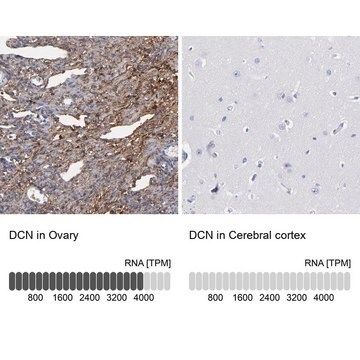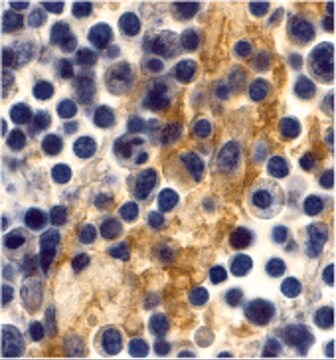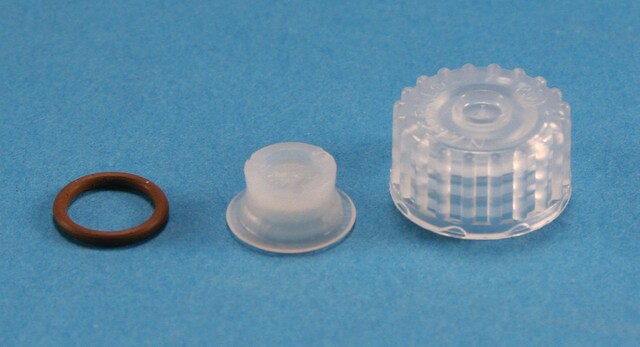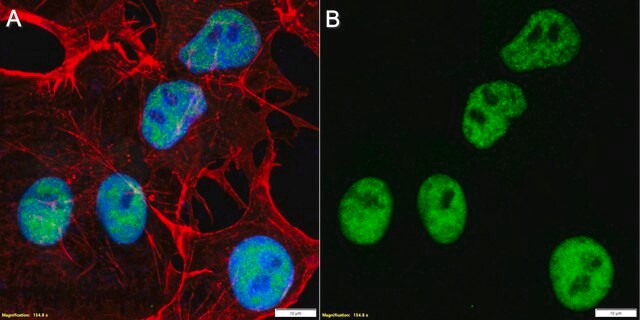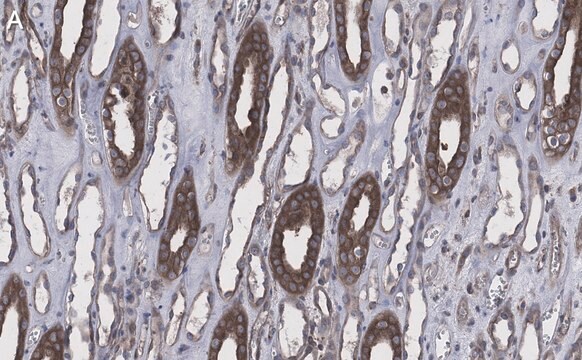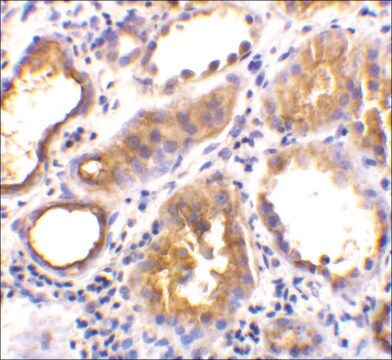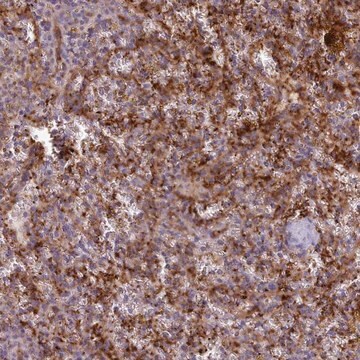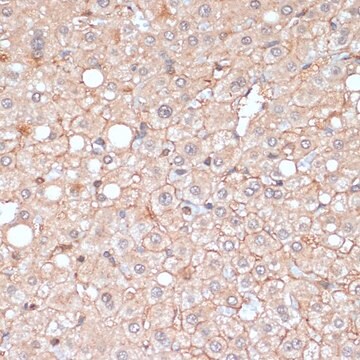推荐产品
生物源
mouse
共軛
unconjugated
抗體表格
purified immunoglobulin
抗體產品種類
primary antibodies
無性繁殖
polyclonal
形狀
buffered aqueous solution
分子量
antigen ~45.8 kDa
物種活性
human
技術
western blot: 1 μg/mL
NCBI登錄號
UniProt登錄號
運輸包裝
dry ice
儲存溫度
−20°C
目標翻譯後修改
unmodified
基因資訊
human ... CD209(30835)
一般說明
Cluster of differentiation 209 (CD209), also known as dendritic cell-specific intercellular adhesion molecule-3-grabbing non-integrin (DC-SIGN), is part of the innate immune system. It is expressed by intestinal dendritic cells and alveolar macrophages. The gene encoding this C-type lectin contains seven exons and is localized on human chromosome 19p13.2.
This gene encodes a transmembrane receptor and is often referred to as DC-SIGN because of its expression on the surface of dendritic cells and macrophages. The encoded protein is involved in the innate immune system and recognizes numerous evolutionarily divergent pathogens ranging from parasites to viruses with a large impact on public health. The protein is organized into three distinct domains: an N-terminal transmembrane domain, a tandem-repeat neck domain and C-type lectin carbohydrate recognition domain. The extracellular region consisting of the C-type lectin and neck domains has a dual function as a pathogen recognition receptor and a cell adhesion receptor by binding carbohydrate ligands on the surface of microbes and endogenous cells. The neck region is important for homo-oligomerization which allows the receptor to bind multivalent ligands with high avidity. Variations in the number of 23 amino acid repeats in the neck domain of this protein are rare but have a significant impact on ligand binding ability. This gene is closely related in terms of both sequence and function to a neighboring gene (GeneID 10332; often referred to as L-SIGN). DC-SIGN and L-SIGN differ in their ligand-binding properties and distribution. Alternative splicing results in multiple variants.
免疫原
CD209 (NP_066978.1, 1 a.a. ~ 404 a.a) full-length human protein.
Sequence
MSDSKEPRLQQLGLLEEEQLRGLGFRQTRGYKSLAGCLGHGPLVLQLLSFTLLAGLLVQVSKVPSSISQEQSRQDAIYQNLTQLKAAVGELSEKSKLQEIYQELTQLKAAVGELPEKSKLQEIYQELTRLKAAVGELPEKSKLQEIYQELTWLKAAVGELPEKSKMQEIYQELTRLKAAVGELPEKSKQQEIYQELTRLKAAVGELPEKSKQQEIYQELTRLKAAVGELPEKSKQQEIYQELTQLKAAVERLCHPCPWEWTFFQGNCYFMSNSQRNWHDSITACKEVGAQLVVIKSAEEQNFLQLQSSRSNRFTWMGLSDLNQEGTWQWVDGSPLLPSFKQYWNRGEPNNVGEEDCAEFSGNGWNDDKCNLAKFWICKKSAASCSRDEEQFLSPAPATPNPPPA
Sequence
MSDSKEPRLQQLGLLEEEQLRGLGFRQTRGYKSLAGCLGHGPLVLQLLSFTLLAGLLVQVSKVPSSISQEQSRQDAIYQNLTQLKAAVGELSEKSKLQEIYQELTQLKAAVGELPEKSKLQEIYQELTRLKAAVGELPEKSKLQEIYQELTWLKAAVGELPEKSKMQEIYQELTRLKAAVGELPEKSKQQEIYQELTRLKAAVGELPEKSKQQEIYQELTRLKAAVGELPEKSKQQEIYQELTQLKAAVERLCHPCPWEWTFFQGNCYFMSNSQRNWHDSITACKEVGAQLVVIKSAEEQNFLQLQSSRSNRFTWMGLSDLNQEGTWQWVDGSPLLPSFKQYWNRGEPNNVGEEDCAEFSGNGWNDDKCNLAKFWICKKSAASCSRDEEQFLSPAPATPNPPPA
生化/生理作用
Cluster of differentiation 209 (CD209) mediates viral infection and activates immune responses. It activates T-cells and aids in their growth. The protein recognizes various pathogens and triggers immunosuppressive reactions. It is involved in the innate immune system. It recognizes numerous evolutionarily divergent pathogens ranging from parasites to viruses that have severe health impacts on humans. CD209/ DC-SIGN mediates the entry of various viruses such as dengue virus, human immunodeficiency virus (HIV), Ebola virus and human cytomegalovirus into the human cells. CD209 acts as an alternative receptor for SARS-CoV-2, a causative agent for the novel coronavirus disease 2019 (COVID-19).
外觀
Solution in phosphate buffered saline, pH 7.4
未找到合适的产品?
试试我们的产品选型工具.
儲存類別代碼
10 - Combustible liquids
水污染物質分類(WGK)
WGK 1
閃點(°F)
Not applicable
閃點(°C)
Not applicable
Genetic variants of CD209 associated with Kawasaki disease susceptibility.
Kuo HC, et al.
PLoS ONE, 9(8), e105236-e105236 (2014)
CD209 promoter polymorphisms associate with HCV infection and pegylated-interferon plus ribavirin treatment response.
Zupin L, et al.
Molecular Immunology, 76, 49-54 (2016)
Human DC-SIGN binds specific human milk glycans.
Noll AJ, et al.
The Biochemical Journal (2016)
The activation of B cells enhances DC-SIGN expression and promotes susceptibility of B cells to HPAI H5N1 infection.
Na-Ek P, et al.
Biochemical and Biophysical Research Communications, 490(4), 1301-1306 (2017)
The association between CD209 gene polymorphisms and pulmonary tuberculosis susceptibility: a meta-analysis.
Yi L, et al.
International Journal of Clinical and Experimental Pathology, 8(10), 12437-12437 (2015)
我们的科学家团队拥有各种研究领域经验,包括生命科学、材料科学、化学合成、色谱、分析及许多其他领域.
联系技术服务部门
